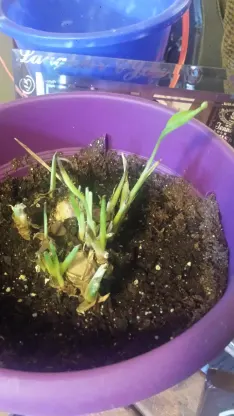Our tomatoes were dying.
I read something on them. Lack of nitrogen, too much sun, not enough water. They were tall and lanky with yellow, spotted, curling leaves at the base of the plant that would shrivel away into brown death. I was upset.
Saint James picked up some fertilizer on the way home the next day, sprinkling each plant around its roots. “They’ll be okay.”
I watered them attentively. We had hot and humid days. A few storms. A lot of sunshine.
They perked up. The cherry and grape tomatoes pushed out maximum fruit, while we received the first of the later tomatoes that were planted. I marveled at their rebound.
Saint James is a faithful gardener, trimming back dead leaves and carefully repotting and positioning plants to thrive. He is patient and loving, and seems to speak life into each leaf as he trims and tends to delicate root structures.
I wonder how many plants he’s saved that I may have just given up on. And wonder at how many aspects of life can be saved with intentionality and careful tending.
This consumerist society we live in doesn’t just end at our spending habits at Christmas. Somehow it’s creeped into our mentalities on just about everything: work, home life, relationships. A socio-cultural mentality that thinks the customer is always right, and post World War 2, that just about darn near everything is made to break and can be replaced.
We think work revolves around what we want to do, and are more concerned with self-actualization than with what the world needs or even what God is calling us to. Many employers don’t seem to be concerned with providing for their employees either. The employee-employer relationship often looks like an abusive relationship these days, with both parties taking advantage of the other for their own profit, and no thought of loyalty or care for the other.
Our home lives revolve around comfort. Our homes are now designed large enough and accommodating enough that we need not venture outside either to stand in awe of God’s creation or to serve a lost and hurting world. We gauge success around how large the house is, and what amenities are offered, instead of the home inside. Our culture has largely abandoned the concept of affordable housing in order to cater to maximum comfort.
We walk away from relationships. Family. Marriages. Children. We say we don’t know how, and give our children over to the world. We say differences are irreconcilable, and turn our backs. We abandon Truth for what we see, and let the world speak over our brokenness and fear, rather than proclaiming Truth even in the darkest places. Even when we’ve neglected these relationships for months, years, we can begin now. With grace and purpose. Some healing will come. Some fruit will be spared.

We are broken. But too many times now, we throw the plant out. Just how much can be saved with intentionality and careful tending?
In John 15, Jesus says, “I am the true vine, and My Father is the gardener. He cuts off every branch in Me that bears no fruit, while every branch that does bear fruit He prunes so that it will be even more fruitful.” (John 15:1-2 NIV)
This verse has terrified me in every way for a long time. Cuts off every branch? How long do we get before we’re cut off? How will we know that we’re not producing any fruit? What does that look like?
While our modern translations read “cut off,” the Greek αἴρω, airei, is literally “to raise, take up, or lift.” If we’re not bearing fruit, those in Christ are lifted up and trained, like the cucumbers climbing high on their trellises in the August heat. The verb is later used in describing Jesus “taking up His cross.” Emmanuel, God with us, takes up His cross for those of us who can bear no fruit.
And the pruning part? The Greek καθαίρω, kathairó, means “to cleanse or purify by purging.” And while God does so much pruning in our lives, we also can decide to cleanse or purify by purging. 2 Timothy 2 encourages us, “If a man cleanses himself from the latter (ignoble purposes), he will be an instrument for noble purposes, made holy, useful to the Master and prepared to do any good work.” (2 Timothy 2:21 NIV)
Isn’t that what we want? To be made useful? To have purpose, and be able to do any good work?
We must let God raise and lift up. We were once dying, but are now saved daily. We must meet Him in the cleansing by purging. To abandon some of the noise, the words and worlds that drain us and suck life out of us. To focus on our roots: the Vine we’ve been grafted into, and just how wonderful and sovereign the Gardener is. To focus on how He raises and lifts us up, and then calls us to do the same.
On our own, trying to care for ourselves, we fall short. We don’t find lasting happiness or peace in living comfortably. We must, each day, devote ourselves to learning to trust the Gardener. Trusting His training, His fertilizing, His pruning. He is intentional and tends to us, oh so carefully. He is patient and loving, and breathes everlasting Life into us as He grafts us into His Body, and creates roots for us that go unshaken in every storm.
Our fruit points back to the Living Water, and has the power to change the world.
Very phonetic…
LikeLike